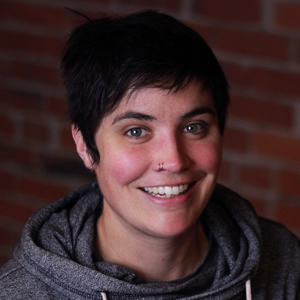Student Leadership at The Seattle School is facilitated by four individuals—three students and one spouse or partner of a student—who lead the four distinct realms of Student Leadership: Anamchara, Sacred Space, Student Council, and Mosaic. Elise Hale-Case is the facilitator of the 2015-2016 Student Council, which also includes Molly Belliveau, Bethany Cole, Lynn Diepenbroek, Jesse Smith, and Albert Wang. Elise graduated with her MA in Counseling Psychology last year, and she is working to complete her MA in Theology & Culture this year. This is her second year as Student Council Facilitator.
Big picture first: What’s the role of Student Council?
Student Council works to be the bridge between the faculty, staff, and students. It considers ways to build the community in the school and support the culture through the lens of academics.
This is your second year as Facilitator. What brought you back?
It’s helped me in my sense of belonging here to connect with students, staff, and faculty. That’s not something I always feel comfortable doing, so I like that the role asks me to do that. It helps me feel more engaged and invested and excited about this community, and to feel a part of this community.
 What are you most proud of from your time with Student Council so far?
What are you most proud of from your time with Student Council so far?
Two things: We had fairly regular film and conversation nights last year. To have the conversations that we were having—about gender, race, sexual orientation, class, shame, sexualtiy—to have those conversations in a pretty honest and raw way without any curricular need or any other agenda, with fewer limitations, was pretty special. There’s a strong desire to continue making space for that kind of conversation.
The second thing is that, if nothing else, Student Leadership is a group of people committed to meeting with each other, eating together, and being in community every week. I feel proud of that, just knowing that I was a part of that, and I think that has a greater impact on this community than any of us realize.
Any plans for this coming year you can tell us about?
We’re hoping to get a trivia night going, a monthly Friday evening trivia night hosted by different people in the community—faculty, staff, students. The intention is both play and learning. My hope is that whoever leads it each night will get to totally choose the trivia and make it about things they’re interested in. So we learn facts, and we learn about the people designing the trivia. The hope, too, would be for more cross-cohort mingling.
Why do you think that—interactions across cohorts—is so important?
Maybe some of it is selfish. I’m in my last years here, and there aren’t as many people in my own cohort, so I want to get to know other folks. I think there’s a lot of learning that can be done across cohorts. The learning curve at this school is so steep that I would’ve really benefitted in my first years from connecting with and being supported by other students who were further along in the process. I think this school makes space for really intense, deep connections, and I want to make a space where connections can happen in a lighter, more playful way.
Speaking of learning from those who’ve gone before, anything you’d like to say to the new cohort?
I’m glad you’re here. And I’m preemptively grateful for whatever work you put into your time here.
How has The Seattle School changed since you’ve been here?
I came into this school feeling pretty nervous, pretty insecure, because I’m gay, and I wasn’t sure how that would be here. I’ve seen a lot of change in the awareness of language and microaggressions that might harm people on the fringes. Not that we’re perfect by any means, but I have seen a significant shift that I’m really grateful for.
And what about you—how have you changed in your time here?
I’ve changed in feeling more secure. I have moments of losing touch with that, but I’m starting to believe that I have something to offer, and I’m learning to articulate what that is.
When you’re not at school or work, what do you do for fun?
I don’t get outside as much as I’d like to, but I think being outside, like in the woods, is pretty grounding for me. I like to do that, I like to play lots of games and sports. I’m on sort of a marathon kick right now, but I don’t know if that’s always for fun. Oh and I go to therapy—that’s fun.

